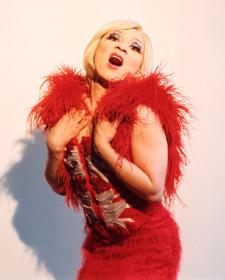Though it’s not uncommon for actors to make extra bucks between gigs by bartending, it takes a special kind of flair to do it in drag. Gay actor José Arias (aka Dyna Thirst) spent five years slinging drinks in a dress — in straight clubs on Richmond St.
“If you want to make money as a bartender in Toronto, you need to be either a steroid muscle boy or a really hot girl,” the El Salvador-born actor says. “Since I couldn’t physically be the kind of guy bars were looking for, it was easier for me to work as a woman.”
For many queens, the thought of walking into a straight bar, let alone working in one, would have them sweating their faces off. But Arias insists he never felt unsafe.
“A few of the girls I worked with sort of figured it out, but I never had any problems with them,” he says. “Besides, there is so much security in those clubs I knew I never needed to worry.”
He also feels that being able to pull off such a performance is about more than aesthetics.
“If you want to be a man dressed as a woman and walk around in the straight world, you have to have a real sense of empowerment,” he says. “When I get into drag, this whole other persona comes out, and no one really questions me.”
Perhaps those years of bartending in heels will serve as training for his performance in Staying Alive, the new play by Martha Chaves, in which he plays three different drag queens. Though Chaves is well known on the stand-up comedy circuit, Staying Alive is her first stage play.
Loosely based on her own life, the show tells the story of a young political refugee who comes to Canada and struggles with issues of identity and being separated from her family, while being watched over by a trio of make-believe drag queens.
“The drag queens represent her conscience in a way,” Arias says. “We’ve been debating if one of them is good and one of them is evil. Ultimately, they help her to find some answers in the end, though they don’t solve her problems for her.”
Arias met Chaves at a fundraiser several months ago, and she invited him to audition for the role.
“Martha is Latin and a lesbian and out, which is part of the reason she wanted me to do this,” he says. “There is not a huge amount of visibility for our community, and both of us want to put it out there that you can be Latin and queer and out, and it’s okay.”
For many queers of Latin descent, family pressure can keep them in the closet. Raised in an evangelical Christian household, with a father who was a minister, Arias faced a substantial struggle in coming out. He left home at 16, due to conflicts with his parents, and attended the Randolph Academy for the Performing Arts after turning down a scholarship to study ballet. Over time, he and his parents have found a form of resolution.
“My father told me recently that my coming out was the most difficult thing our family has ever had to deal with, and everything since has been easy by comparison,” he says. “I think that’s his way of telling me he’s accepted it. They still tell me they pray for me, but at this point I think they’ve given up the idea that I’m going to marry a woman and have children.”


 Why you can trust Xtra
Why you can trust Xtra


